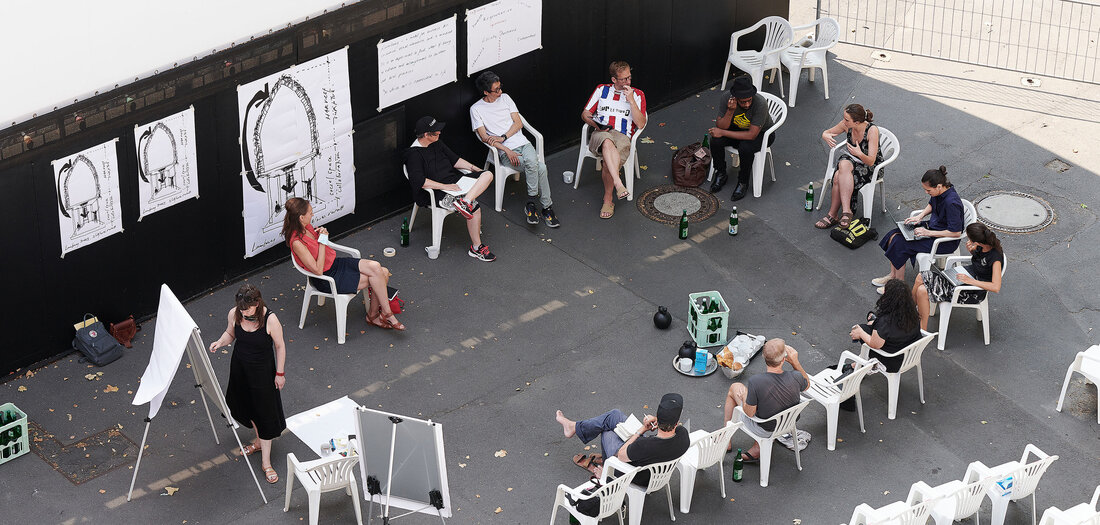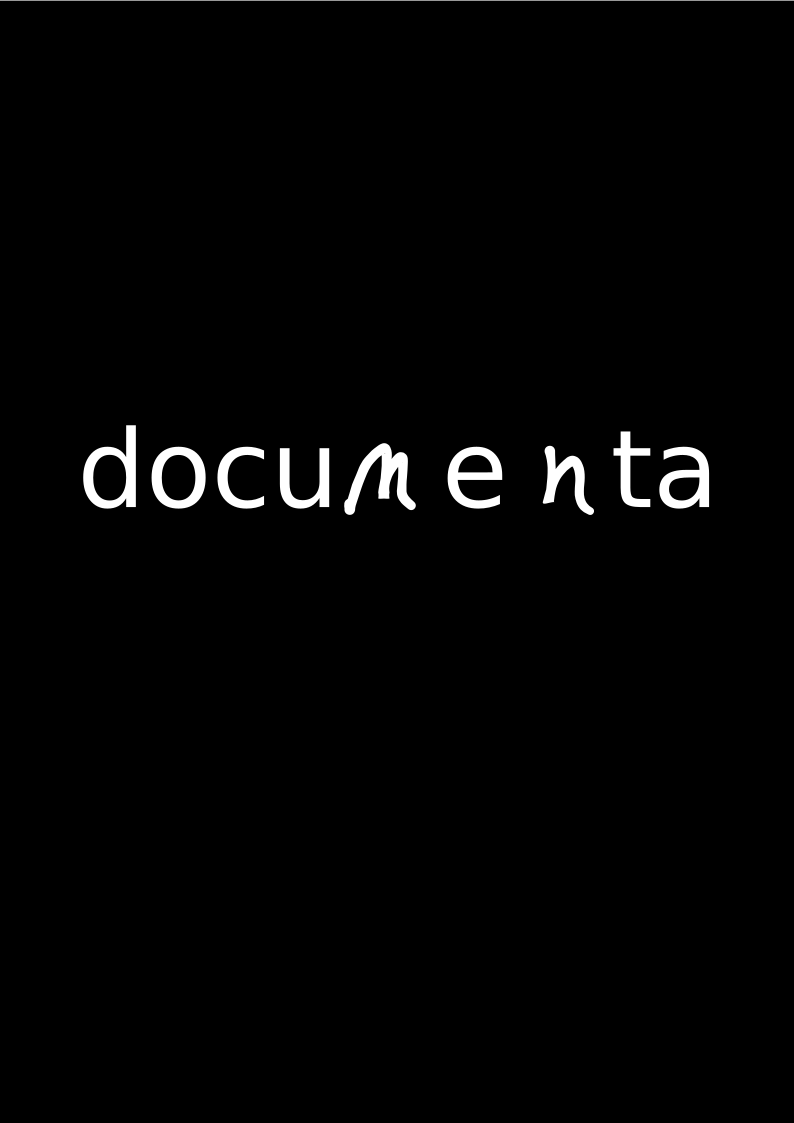#kunst #politik #documenta15 #ruangrupa #lumbung #kollektiv #globaler-süden #postkoloniale-perspektive #antisemitismus #zensur #deutschland #wertewesten
Über die vorläufige Bilanz zur Documenta 15, gemeinsames Lernen sowie westlichen Umgang mit dem »globalen Süden«. Ein Gespräch mit Ruangrupa /Auszug (Interview: Ulrich Schneider)
Als die Documenta Mitte Juni eröffnet wurde, sprach man in den Festreden von der Perspektiverweiterung auf den »globalen Süden«. Gleichzeitig bedeutet das natürlich auch, die politischen und ökonomischen Ungerechtigkeiten in der Welt zum Thema zu machen.
I. H.: Das ist vollkommen richtig. In Erklärungen und auch symbolisch hat man den »globalen Süden« für wichtig erachtet, aber in der Realität haben sich die Offiziellen darauf nicht einlassen wollen. Wir haben in ihrem Verhalten und in ihren Reaktionen die realen Machtverhältnisse in dieser Welt erlebt, Druck auf die Schwächeren, Machtpolitik zur Durchsetzung eigener Interessen und Einschränkungen, wenn die eigenen Vorstellungen betroffen waren. Ein so arrogantes Verhalten mussten wir selbst bei zahlreichen Medien erleben. Nur wenige Journalisten haben sich bei der Betrachtung und Kommentierung der Ausstellung tatsächlich auf das Anliegen der Künstlerkollektive eingelassen. Natürlich gab es auch einige gute Erfahrungen, wenn Zeitungen tatsächlich intensiver nachgefragt haben.
Zudem gibt es einen deutlichen Unterschied zwischen der Reaktion der Medien und der politischen Akteure auf der einen Seite und den Besuchern und den einfachen Menschen auf der anderen. Während viele Offizielle ihre Vorurteile bestätigt sehen wollten, waren die Besucher weitgehend offen, haben nachgefragt, sich auf die Angebote eingelassen. Wir hatten den Eindruck, während manche Medien die Debatte um die Ausstellung für ihre Interessen instrumentalisierten, waren die Menschen in Kassel bereit, die tatsächlichen Aussagen dieser Ausstellung wahrzunehmen.
Gefallen hat mir Ihr Leitspruch zu Beginn der Documenta, der lautete: »We do not make art, we make friends« – »Wir machen keine Kunst, wir schließen Freundschaften.« Kann ein solcher Ansatz denn eine Weltkunstausstellung tragen?
I. H.: Unser Verständnis von Kunst hat viel mit der Frage zu tun, wie wir in unserem alltäglichen Leben auf politische, soziale und gesellschaftliche Herausforderungen reagieren. Wir versuchen Menschen und Künstler anzuregen, mit den historischen und sozialen Verhältnissen angemessen in Bildern, Plastiken, Installationen oder Projekten umzugehen, nicht in Form einer Hierarchie, sondern in einem kollektiven Prozess, den wir im Lumbung-Prozess umgesetzt sehen. Unsere Intention ist es nicht, mit dieser Documenta ein politisches Statement abzugeben, aber die gesellschaftlichen Verhältnisse erzwingen es in unserem alltäglichen Leben, dass wir sowohl Künstler als auch Aktivisten sind.
A. N.: Unsere Kunst – und das gilt auch für fast alle eingeladenen Künstlerkollektive – ist nicht nur für Museen, den Kunstmarkt oder Sammler gemacht. Kunst muss sich in der Realität beweisen. Auf diese Weise machen wir unsere Kunst lebendig.
R. A.: Wenn wir von zeitgenössischer Kunst sprechen, dann verstehen wir darunter Kunst, die auf die aktuellen Verhältnisse reagiert. Damit sind aus unserer Sicht keine künstlerischen und politischen Vorgaben verbunden, sondern ein Dialog, die gemeinsame Artikulation und ein gemeinsamer Ausdruck.
Natürlich müssen wir über Antisemitismus sprechen. Wenn man die deutschen Leitmedien verfolgte, gab es in diesen 100 Tagen fast kein anderes Thema. Wie habt ihr diese Debatte erlebt?
A. M.: Zuerst einmal waren wir vollkommen überrascht über die Vorwürfe, die schon lange vor der Documenta gegen uns erhoben worden waren. Es gibt gar keinen Zweifel, jeder von uns und auch die eingeladenen Künstlerkollektive stehen in klarer Gegnerschaft zu Antisemitismus, zu Rassismus, Diskriminierung oder Ausgrenzungsideologien. Es ist ärgerlich, dass wir dieses immer wieder betonen müssen.
Wir haben verstanden, dass das Thema hier in Deutschland in einer anderen Intensität und mit anderen Begrifflichkeiten verbunden ist, und waren bereit zu lernen. Wir mussten jedoch erleben, dass dieser Lernprozess kein ehrlicher Dialog war. Insbesondere die mediale Kampagne um das Banner »People’s justice« zeigte uns, dass man uns eine bestimmte Linie vorgeben wollte, aber nicht bereit war, uns zuzuhören. Die einen kritisierten, dass wir zuerst mit den Künstlern sprachen, also nicht schnell genug reagierten, viele ignorierten unsere Statements. Die anderen sahen in ihnen nur »Verteidigungen«, was dann wiederum uns zum Vorwurf gemacht wurde.
Natürlich wollen wir nicht generalisieren. Es gab einige Medien, die mit uns sprachen, die in der Überprüfung der Fakten zu ernsthaften Resultaten kamen, über die wir gemeinsam hätten reden können. Aber in der Mehrheit gab es pauschale Vorwürfe gegen uns. Selbst Tatsachen wurden nicht zur Kenntnis genommen.
Aber die Vorwürfe kamen ja nicht nur von den Medien. Auch eine Künstlerin, Hito Steyerl, zog sich aus der Ausstellung zurück.
R. A.: Das ist ein solches Beispiel, wo Fakten verdreht wurden. Hito Steyerl war nicht von Ruangrupa eingeladen worden, sondern ein Künstlerkollektiv hat sie in ihre Präsentation eingeladen. Die Medien behaupteten dennoch, sie sei der »Star der Documenta«. Was uns und auch das Kollektiv sehr enttäuscht hat, war, dass sie ihren Rückzug nur mit einer Twitter-Nachricht verkündet hat. Weder hat sie mit uns als Kuratoren noch mit dem Künstlerkollektiv darüber gesprochen. Wir kennen nur die Informationen, die über die Medien dazu zu lesen waren. Das ist ein sehr enttäuschendes Verhalten.
I. H.: Wir sind immer offen für einen Dialog, auch für Kritik, wenn sie denn konstruktiv vorgetragen wird. So befinden wir uns in einem intensiven Dialog mit Besuchern auch zu diesem Thema. Während wichtige Politiker es einfach ablehnen, die Ausstellung zu besuchen, hatten wir kürzlich eine Gruppe jüdischer Studenten aus Berlin zu Gast in Kassel. Nach ihrem Rundgang haben wir ausführlich miteinander gesprochen. Sie betonten zum Abschluss, sie hätten hier keinen Antisemitismus vorgefunden. Das sind Rückmeldungen, die für uns wichtig sind.
Anders verhalten sich bestimmte Politiker, wie uns ein Besucher erzählte. Vor einigen Wochen hat der Vorsitzende der Deutsch-israelischen Gesellschaft, Volker Beck, das Fridericianum aufgesucht – nicht um die Documenta besichtigen, sondern um einen Fototermin bei den Exponaten des Kollektivs »Lutte des Femmes« abzuhalten. Zahlreiche Journalisten waren eingeladen, er blickte ernst auf eine DIN-A5-Broschüre, in der auf zwei Seiten acht Zeichnungen zum Israel-Palästina-Konflikt abgedruckt sind. Dann ließ er sich fotografieren, wie er die Kommentarzettel zu diesem Exponat in der Hand hielt, ohne sie jedoch zu lesen. Anschließend verließ er das Fridericianum, um vor der Tür »tief betroffen« einem bereitstehenden Fernsehteam ins Mikrofon seiner Empörung über den Antisemitismus auf der Documenta 15 Ausdruck zu verleihen. Wer nichts von der Ausstellung sehen will, wie kann der darüber urteilen?
Nach der Hälfte der Ausstellungszeit hat der Aufsichtsrat Ihnen ein »Expertengremium« zur Seite gestellt. Nun hat dieses eine »Empfehlung« abgegeben, auf die Sie mit einer heftigen Erklärung reagiert haben. Wie ist das zu verstehen?
I. H.: Wir haben verstanden, dass es im Interesse des Aufsichtsrates und der Shareholder der Documenta 15 war, ein solches Gremium einzusetzen. Es war für die deutsche Perspektive offenbar wichtig. Wir mussten jedoch erleben, dass diese »Experten« alle Standards wissenschaftlicher Recherche missachteten und einen Bericht und »Schlussfolgerungen« vorlegten, die diese Debatte instrumentalisieren.
Es ist für uns vollkommen unverständlich, dass sie für ihren Bericht weder ausführlich mit uns als Kuratorenteam noch mit den beteiligten bzw. kritisierten Künstlerkollektiven gesprochen haben. Man muss offen sagen, sie ignorierten bewusst die Perspektive der anderen bei ihrer Untersuchung. Das ist weder wissenschaftlich noch seriös. Das ist nur verrückt. Deshalb haben wir am Wochenende gemeinsam mit weiteren Künstlerkollektiven einen Brief an den Aufsichtsrat und die Shareholder unter dem Titel »We are angry, we are sad, we are tired, we are united« (Wir sind wütend, wir sind traurig, wir sind müde, wir sind vereint –
https://werefuseweareangry.wordpress.com/, jW) geschickt, in dem wir ausführlich zu diesem Vorgang Stellung nehmen. Auch diesmal mussten wir erleben, dass die Medien unsere Aussagen weitgehend ignorieren.
R. A.: Dabei ist es doch hilfreich, von Experten begleitet zu werden, von Personen, die mit dem Gegenstand vertraut sind und zusätzliche Blickrichtungen einbringen können. Aber Experten sollten unterstützen und nicht denunzieren. Die Künstlerkollektive haben vielfach solche Experten genutzt, auch aus der Region Kassel. Das ergibt für uns Sinn, aber nicht dieses »Expertengremium« aus der Politik.
- Vollständiges Interview: https://www.jungewelt.de/artikel/434889.kunst-die-reise-ist-nach-100-tagen-nicht-zu-ende.html
Ruangrupa wurde 2000 als interdisziplinäres Kollektiv in Indonesien gegründet. Ausgewählt von einer internationalen Findungskommission, wurde das Kollektiv 2019 vom Aufsichtsrat mit der künstlerischen Ausrichtung der Documenta 15 beauftragt. Es vertritt ein Modell gemeinschaftlicher Nachhaltigkeit in ökologischer, sozialer und ökonomischer Hinsicht. Dabei geht es um soziale Teilhabe und die Teilung von Ressourcen, Ideen oder Wissen. Vier Mitglieder von Ruangrupa traf jW in Kassel zum Gespräch, im Bild: Andan Mirwan, Ajeng Nurul Aini, Iswanto Hartono, Ulrich Schneider (Autor jW), Reza Afisina (v. l. n. r.). Die Documenta 15 läuft noch bis zum 25. September.



